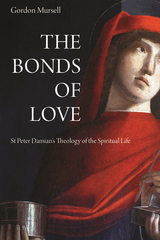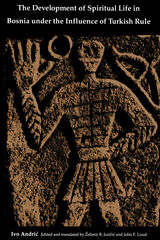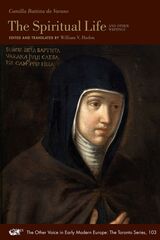3 books about Spiritual Life

The Bonds of Love
St. Peter Damian's Theology of the Spiritual Life
Gordon Mursell
Catholic University of America Press, 2022
St Peter Damian (1007-1072) is an exceptional example of a paradox that is found in many saints and thinkers through the ages (St Jerome, St Bernard, St Bridget of Sweden, St Teresa of Avila and Thomas Merton come to mind) – of a lifelong tension between two competing vocations: the call to solitude and holiness and the call to prophetic social and ecclesial engagement. The author has explored this tension throughout his adult life, both in his published work and in his own life as an Episcopalian/Anglican priest and later bishop.
Damian’s “The Book of ‘The Lord be with you’” is a profound exploration of the spirituality of solitude, whereas his “Book of Gomorrah” is an intense attack on clerical sexual abuse which has helped to give Damian a new recent prominence in the light of the huge challenges facing the Church today. The Bonds of Love shows that the paradox at the heart of Damian's life and everything he cared about was rooted in the remarkable theology of love which finds expression across the whole of his work and gives it both coherence and dynamism. His life and spirituality are of far more than academic interest, and will make a major contribution, not only to those committed to ecclesial reform and renewal, but to all who struggle to live with the kind of competing tensions that made St. Peter Damian who he was.
[more]

The Development of Spiritual Life in Bosnia under the Influence of Turkish Rule
Ivo Andric
Duke University Press, 1990
Ivo Andric (1892-1975), Nobel Prize laureate for literature in 1961, is undoubtedly the most popular of all contemporary Yugoslav writers. Over the span of fifty-two years some 267 of his works have been published in thirty-three languages. Andric’s doctoral dissertation, The Development of Spiritual Life in Bosnia under the Influence of Turkish Rule (1924), never before translated into English, sheds important light on the author’s literary writings and must be taken into account in any current critical analysis of his work.
Over his long and distinguished career as a diplomat and man of letters Andric never again so directly or discursively addressed, as a social historian, the impact of Turkish hegemony on the Bosnian people (1463–1878), a theme he returns to again and again in his novels. Although Andric’s fiction was embedded in history, scholars know very little of his actual readings in history and have no other comparable treatment of it from his own pen. This dissertation abounds with topics that Andric incorporated into his early stories and later novels, including a focus on the moral stresses and compromises within Bosnia’s four religious confessions: Catholic, Orthodox, Jew, and Muslim.
Z. B. Juricic provides an extensive introduction describing the circumstances under which this work was written and situating it in Andric’s oeuvre. John F. Loud’s original bibliography drawn from this dissertation stands as the only comprehensive inventory of historical sources known to have been closely familiar to the author at this early stage in his development.
Over his long and distinguished career as a diplomat and man of letters Andric never again so directly or discursively addressed, as a social historian, the impact of Turkish hegemony on the Bosnian people (1463–1878), a theme he returns to again and again in his novels. Although Andric’s fiction was embedded in history, scholars know very little of his actual readings in history and have no other comparable treatment of it from his own pen. This dissertation abounds with topics that Andric incorporated into his early stories and later novels, including a focus on the moral stresses and compromises within Bosnia’s four religious confessions: Catholic, Orthodox, Jew, and Muslim.
Z. B. Juricic provides an extensive introduction describing the circumstances under which this work was written and situating it in Andric’s oeuvre. John F. Loud’s original bibliography drawn from this dissertation stands as the only comprehensive inventory of historical sources known to have been closely familiar to the author at this early stage in his development.
[more]

The Spiritual Life and Other Writings
Camilla Battista Da Varano
Iter Press, 2023
A new edition of all of de Varano's known works, several of which have never before appeared in English.
Camilla Battista da Varano (1458–1524) was a Franciscan nun and the author of profound spiritual writings in both prose and verse. Raised in the princely household of Camerino in north-central Italy, she put her thorough humanist education to use explaining her own spiritual experience and delivering advice to others. Varano composed ecstatic revelations, prayers, poems, hagiography, spiritual direction, and commentary on convent legislation. She drew on a wide variety of sources, including scripture and Church Fathers, plus popular literature and proverbs. Varano was an erudite woman of considerable complexity, defying many of the commonplace images we associate with religious women of the late fifteenth and early sixteenth centuries.
Camilla Battista da Varano (1458–1524) was a Franciscan nun and the author of profound spiritual writings in both prose and verse. Raised in the princely household of Camerino in north-central Italy, she put her thorough humanist education to use explaining her own spiritual experience and delivering advice to others. Varano composed ecstatic revelations, prayers, poems, hagiography, spiritual direction, and commentary on convent legislation. She drew on a wide variety of sources, including scripture and Church Fathers, plus popular literature and proverbs. Varano was an erudite woman of considerable complexity, defying many of the commonplace images we associate with religious women of the late fifteenth and early sixteenth centuries.
[more]
READERS
Browse our collection.
PUBLISHERS
See BiblioVault's publisher services.
STUDENT SERVICES
Files for college accessibility offices.
UChicago Accessibility Resources
home | accessibility | search | about | contact us
BiblioVault ® 2001 - 2024
The University of Chicago Press









